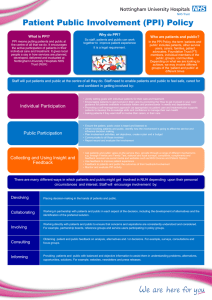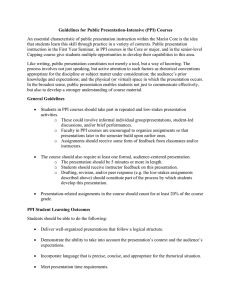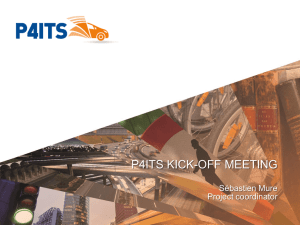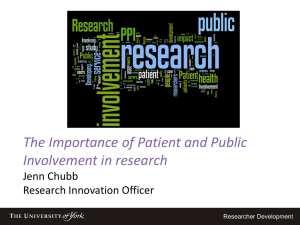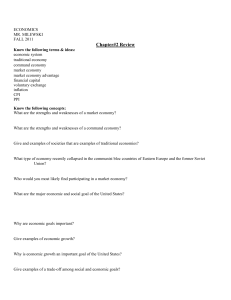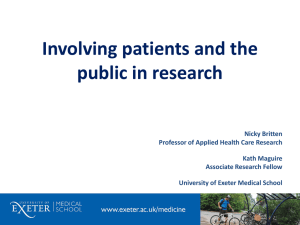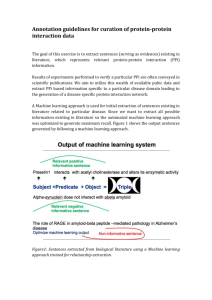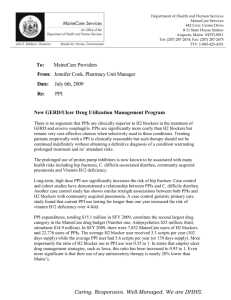Patient and Public Involvement in the education of tomorrow’s doctors E S
advertisement
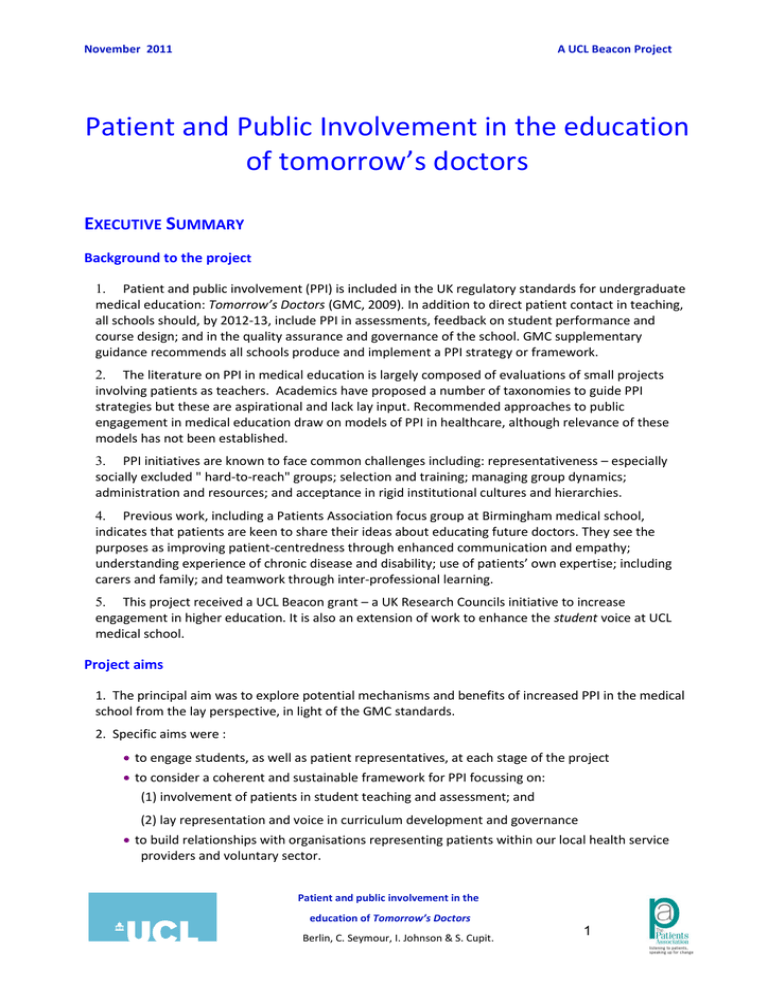
November 2011 A UCL Beacon Project Patient and Public Involvement in the education of tomorrow’s doctors EXECUTIVE SUMMARY Background to the project 1. Patient and public involvement (PPI) is included in the UK regulatory standards for undergraduate medical education: Tomorrow’s Doctors (GMC, 2009). In addition to direct patient contact in teaching, all schools should, by 2012-13, include PPI in assessments, feedback on student performance and course design; and in the quality assurance and governance of the school. GMC supplementary guidance recommends all schools produce and implement a PPI strategy or framework. 2. The literature on PPI in medical education is largely composed of evaluations of small projects involving patients as teachers. Academics have proposed a number of taxonomies to guide PPI strategies but these are aspirational and lack lay input. Recommended approaches to public engagement in medical education draw on models of PPI in healthcare, although relevance of these models has not been established. 3. PPI initiatives are known to face common challenges including: representativeness – especially socially excluded " hard-to-reach" groups; selection and training; managing group dynamics; administration and resources; and acceptance in rigid institutional cultures and hierarchies. 4. Previous work, including a Patients Association focus group at Birmingham medical school, indicates that patients are keen to share their ideas about educating future doctors. They see the purposes as improving patient-centredness through enhanced communication and empathy; understanding experience of chronic disease and disability; use of patients’ own expertise; including carers and family; and teamwork through inter-professional learning. 5. This project received a UCL Beacon grant – a UK Research Councils initiative to increase engagement in higher education. It is also an extension of work to enhance the student voice at UCL medical school. Project aims 1. The principal aim was to explore potential mechanisms and benefits of increased PPI in the medical school from the lay perspective, in light of the GMC standards. 2. Specific aims were : to engage students, as well as patient representatives, at each stage of the project to consider a coherent and sustainable framework for PPI focussing on: (1) involvement of patients in student teaching and assessment; and (2) lay representation and voice in curriculum development and governance to build relationships with organisations representing patients within our local health service providers and voluntary sector. Patient and public involvement in the education of Tomorrow’s Doctors Berlin, C. Seymour, I. Johnson & S. Cupit. 1 November 2011 A UCL Beacon Project Team and partners/contributors 1. student. In addition to UCL academics, the project team included a junior doctor and a medical 2. Many others contributed to this project: UCL students and staff; simulated and surrogate patients; those working in non-statutory or community services involved in the curriculum; professional PPI leads in affiliated NHS Trusts and GP practices; and the Patients Association. 3. groups. Over 40 patients and advocates recruited through these services participated in the focus 4. The Patients Association (PA) – (a national, independent charity that advocates for better access to accurate and independent information for patients and the public, equal access to high quality health care for patient, and the right for patients to be involved in all aspects of decision making regarding their health care) – organised and led the largest focus group based on an agreed agenda. Method – what we did 1. This was a multi-level project consisting of staff interviews, an on-line student survey, key PPI informant interviews and five focus groups. The focus groups were audio-taped and transcribed. All data was pooled and analysed for themes verified by at least two members of the team. 2. A novel aspect was the involvement of students in all stages of the project. Key findings 1. The results were organised under four headings: expected purposes; expected challenges; unexpected purposes; and unexpected challenges. 2. Overall, participants were very positive about PPI in medical education. 3. The expected purposes and challenges conformed to those reported in the PPI literature (summarised above) and suggestions were made for addressing these challenges. 4. The data provided specific insights of immediate relevance to educators on caring, importance of the link between consent and safety, learning from patients with cognitive and sensory impairment by including family and carers, and focusing on the experience of illness by devising “patient pathways”. 5. Patients are keen to offer feedback/advice to students on their performance but are sensitive to the possible negative impact on learners of unconstructive criticism, bias or prejudice. 6. They support “a PPI forum” or reference groups that could: comment on new teaching initiatives and documents; recommend innovations; and monitor progress towards patient centredness by looking at relevant student feedback and discussing significant events. 7. There was less of an appetite for involvement in committees and governance structures. 8. Patients and public representatives are especially motivated by concerns about the poor rolemodelling students may be exposed to by the conduct of their clinical teachers. 9. Medical students added value to all aspects of the project. They formed an alliance with lay representatives in focus group discussions, which was mutually informative and reassuring. A key role for faculty in PPI should be to facilitate this alliance, which promotes a more open, accountable, patient-centred medical school. 10. The project has a number of limitations described in the full report. Patient and public involvement in the education of Tomorrow’s Doctors Berlin, C. Seymour, I. Johnson & S. Cupit. 2 November 2011 A UCL Beacon Project Key recommendations General 1. Disseminate and implement key findings within and outside UCL through reports, publications and presentations. PPI & Governance 2. Include PPI in the Medical School Strategy. 3. Establish mechanisms to “Open-up” the medical school through, for example, open days, websites, fact-sheets and posters 4. Foster new links with, for example, NHS and Royal College PPI professionals, UCL researchers, other medical schools, and representative organisations such as the Patients Association. 5. Maintain map of PPI activity and evaluate the PPI framework annually against GMC standards 6. Develop a Medical School PPI Framework building on the project findings and links established. This framework could include: 6.1 Realistic appraisal of goals and resources required to deliver these; 6.2 Identification of a named PPI “champion” with access to administrative and financial support;. 6.3 Establishment of PPI Forum(s) jointly with students to feedback on progress towards greater patient-centredness by reviewing developments in the new curriculum MBBS 2012 ; PPI & curriculum design 7. Ensure each “Patient Pathway” draws explicitly on patient experience and expertise in a format appropriate to the clinical field; 8. Incorporate the patient’s perspectives into developing teaching on ethics, communication skills, practical procedures, feedback to students, and significant events to address the “hidden curriculum”; 9. Draw on the expertise of existing simulated, proxy and expert patients in module and assessment design 10. Complete work on the Medical School PPI Toolkit to provide guidance for patient representatives, students and staff; 11. Focus on engaging the socially excluded, and those with cognitive and sensory impairment, by building on existing links with community and voluntary organisations Patients as teachers and assessors 12. Ensure students and staff see that “all patients can be teachers” 13. Help students make their role and their learning more transparent for patients 14. Develop students skills in seeking advice and feedback on their performance from patients 15. Encourage students to build alliances between themselves , patients and their carers in each clinical encounter A. Berlin, C. Seymour, I. Johnson & S. Cupit, UCL. (with thanks to all participants) with thanks to all participants) Patient and public involvement in the education of Tomorrow’s Doctors Berlin, C. Seymour, I. Johnson & S. Cupit. 3
